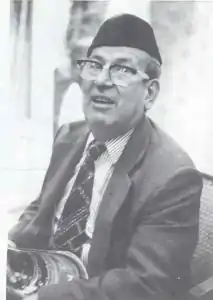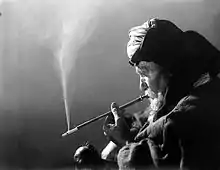Murad al-Daghistani | |
|---|---|
| مراد الداغستاني | |
 | |
| Born | Moussali Mourad Al-Daghistani 1917 Mosul, Iraq |
| Died | 27 July 1984 Iraq |
| Nationality | Iraqi |
| Known for | Photographer |
| Website | Murad al-Daghestani via Al-Hasso Gallery |
Murad al-Daghistani, Murad Ajamat (Kumyk: Murat Acamat, 1917–1984) was a pioneering Iraqi photographer of Kumyk descent. who was active in Mosul from the mid-1930s, and later worked in Baghdad. He achieved international recognition for the quality of his photographs which recorded scenes of every-day life and people.
Life and career

Murad al-Daghistani was born in 1917 in Mosul, Iraq. His father was Abdul-Hamit Ajamat, a Kumyk engineer who participated in building the Iraqi railroad.[1]
It is not clear how Dagestani was exposed to early photography. Mosul was a city that had an established photography and film-making industry dating to the late 19th century.[2] Local men were using cameras to assist archeologists from around 1895.[3] Following the first world war, a photographer named Tartaran, set up a studio at the entrance to the Mosul Elementary School.[4] It is possible that Dagestani observed the photographer at work during his school years. Even before he had graduated from high school, he had picked up the camera. By 1935, he had established himself as a talented photographer.[5]
His studio and photography shop, situated in Al-Dawasah Street, Mosul (opposite the Sinal Atlas) was simply called Murad Photographer.[6]

For subject matter, he drew on the street life and industry in and around the city of Mosul, especially life along the Tigris river. He always carried his camera, ready to capture a moment or event. At sunrise, he could be found at the riverside, where he loved to watch fishing boats and attempted to capture the fisherman at work. In his studio, he produced more creative portraits of dervishes, tribal men and everyday people.[7]
He influenced a number of younger photographers, including Hadi Al Najjar (b. 1957) and Mahmoud Saeed.[8] The artist and photographer, Mahmoud Saeed, recalled that, as a youth, he loved to watch gifted photographers, especially al-Daghistani, as he photographed every day scenes around Mosul and how he "immortalized a fishing net as it filled the air before falling to the river, or a cart travelling a muddy road, memorable faces of dervishes, of aged men and women, and of active children."[9]
He was a very heavy smoker and had one lung removed in the 1970s, after which he lived another ten years. He died on 27 July 1984.[10]
Work

He was a realist; his photographs which were primarily in black and white, captured fleeting moments of human endeavour. For this ability to capture a frozen moment in time, he was called the "sniper photographer".[11] He was awarded the Certificate of Creativity from Brazil and was just one of eight artists in the world to receive this award for the portrayal of situations and movements of people that may not recur again.[12]
He participated in more than eighty international exhibitions in Europe and the Americas, including the Man and Sea Exhibition (Yugoslavia, 1965) and Presenting a Hundred International Pictures (Germany)[13]
His photos appeared in numerous international magazines, including the magazine, Photographic Photography as well as many English, Iraqi and Arabic magazines.[14] Examples of his work are held in the archive of the Arab Image Foundation (AIR).[15]
His most well-known and widely reproduced photographs are:
- The Old Man
- Sousou the Dancer and the Snake Baghdad, 1930[16]
- The Smoker, 1930s (pictured)
- Fishing, 1930s
- River Crossing, 1930s
- Boats
- Clay Work
- Waiting
- Casting the Net 1930s (pictured)
Legacy
He is the subject of a book, Murad Al-Dagestani: The Dialectic of Man and Nature, written by Professor Najman Yassin and published in Baghdad in 1985.[17]
See also
External links
- Arab Image Foundation Digital resource and archive - currently digitising hundreds of photographs made by Daghistani and other Arab photographers
References
- ↑ Bagaudin Ajamatov, "He Would be the Pride of Dagestan as Well", Yoldash Newspaper, 4 July 1997; Bagaudin Ajamatov, "Murad Ad-Dagistani from the Ajamatov Family", Makhachkala, 2009
- ↑ Al-Alaf. I., "The Origins of Photography in Iraq" Online: (translated from Arabic); Dankour, E. and Darwish, M.F., Iraqi Guidebook, Baghdad, 1937
- ↑ Kalash, K., "In Digital Technology, Solar Photography is a Time-immemorial Profession, " Iraq Journal,
- ↑ Alaq, A., "The Origins of Photography in Iraq", Arab Pictures, 24 December 2015, Online: Archived 2017-07-03 at the Wayback Machine (translated from Arabic)
- ↑ Shaker, D., "Iraqi artist Murad Dagestani on the Anniversary of his Death," Online: (translated from Arabic)
- ↑ Al Sheikh, L., "My Memories of the International Photographer Murad Dagestani", Ahewar, [The Civilized Dialogue Section], issue no. 5876. 18 May 2018 Online: (translated from Arabic); Al-Darwish, A., "A Distinguished Photographer: Murad Dagestani Pioneer of Pioneers of Modernity in the Arab world," [Recollections of photographer, Anwar Al Darwish], Online: (translated from Arabic)
- ↑ Yassin, N., "The Photography of Murad al-Daghistani: The Triumph of Life in the Face of Circumstance," Ur, [Magazine of the Iraqi Cultural Centre, London] 1981, p. 173
- ↑ Najjar, H. al, "A Country without History is Rootless”: Baghdad-based photographer Hadi Al Najjar", [Interview], Ibrahimi Collection, July 25, 2017, Online:
- ↑ Saeed, M., A Portal in Space, University of Texas Press, 2016, p. 75
- ↑ Said, S.E., "Najdan Yassin puts a Critical Reading of Murad Dagestani's Photographic Work," [Book Review], Azzaman, 8 April 2014, Online:
- ↑ "Murad Al-Daghistani", Journal of Photography, Online:
- ↑ "Murad Al-Dagestani the Sniper Photographer: Leading Photography Artist 1917-1984," Safahi [Jordan], 21 June 2013, Online: Archived 2013-12-13 at the Wayback Machine (translated from Arabic]
- ↑ "Murad Al-Daghistani", Journal of Photography, Online:
- ↑ "Murad Dagestani Photographer Sniper", AlGardenia, 7 June 2013, Online: (translated from Arabic)
- ↑ "The Father of Iraqi Photography Latif al-Ani: Artist Profile," Art Radar Journal, 7 August 2017, Online:
- ↑ "Paris Photo: Scène Arabe et Iranienne à l'honneur," La Croix, 21 November 2009, Online: (translated from French)
- ↑ Said, S.E., "Najdan Yassin puts a Critical Reading of Murad Dagestani's Photographic Work," [Book Review], Azzaman, 8 April 2014, Online:; Note that the work was published in Arabic.